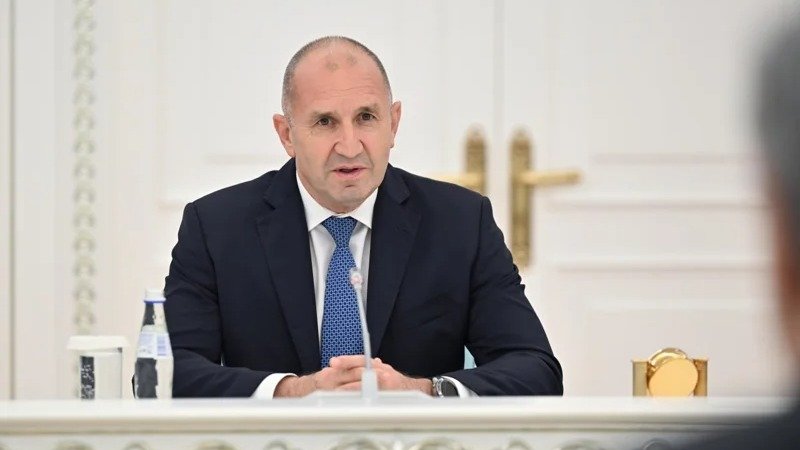When the Middle Corridor becomes large: What Astana and Sofia agreed on
Complementarity and pragmatism - these two components characterize the results of the official visit of the President of Bulgaria to Kazakhstan. What the leaders of the two countries agreed on is in the material of the analytical observer of the Kazinform News Agency.

An important niche
The last few months have been rich in meetings with European leaders. In March, the President of Slovenia Nataša Pirc-Musar paid an official visit to Kazakhstan. In April, the C5+EU summit was held in Samarkand. In May, an informal summit of the Organization of Turkic States (OTS) in Hungary and an official visit to our country by the Prime Minister of Italy Giorgia Meloni, who participated in the first summit Central Asia - Italy, took place.
The current week is no less eventful. After negotiations with the President of Bulgaria Rumen Radev, an official visit to Kazakhstan by the Prime Minister of Slovakia Robert Fico is expected.
It is obvious that in the conditions of geopolitical turbulence, relapses of bloc thinking and economic fragmentation of the world, it is pragmatism that controls many political processes.
Globalization is bursting at the seams, and in these conditions, states and businesses are looking for ways that will allow them to bypass conflict zones with minimal losses, build new trade chains and effective logistics links.
Kazakhstan occupies an important niche in this regard, as evidenced by the intensity of contacts on the foreign policy track and, most importantly, their effectiveness. Negotiations with the President of Bulgaria were no exception.

Key partners
The time for the visit was chosen symbolically: last week marked 33 years since the establishment of diplomatic relations between our countries.
“Bulgaria is one of Kazakhstan's most important partners in Europe, with whom we have deep political and economic ties. Our bilateral cooperation demonstrates stable dynamics in a variety of areas,” President Kassym-Jomart Tokayev emphasized.
Bulgarian President Rumen Radev is a former military man and, probably, like all military men, he is straightforward. It was noticeable that if he spoke complementarity, it was not dictated by protocol. His words seemed to come from the heart.
“Bulgaria highly values the strengthening of traditionally warm and fruitful ties between our countries and peoples. We consider Kazakhstan a key and priority partner in Central Asia. Your successes over the years are admirable: rapid economic growth, breakthroughs in innovation, science, education and high technology. Yesterday I visited the national space center. Your achievements made a deep impression on me,” Rumen Radev noted.

Emphasis on economic cooperation
Of course, if we talk about economic relations, Astana and Sofia demonstrate relatively modest indicators. About 60 companies with Bulgarian participation operate in our country, and mutual trade, although it has grown fourfold, amounted to $375 million last year.
Moreover, what is characteristic is that the main figures are formed by the export of Kazakh oil, which reached record levels in 2024 - it grew 48 times to $242.2 million.
Nevertheless, the development of relations is on the rise. Currently, joint projects worth over $117 million with the creation of new jobs are being developed. To intensify the partnership, the President of Kazakhstan proposed to create a Kazakh-Bulgarian Business Council. Experts commenting on the results of the visit are optimistic.
“The emphasis during the high-level negotiations was on deepening trade and economic cooperation, which is becoming increasingly relevant in the context of a changing international environment. The memorandums of understanding signed during the negotiations between the ministries of transport on the development of the Middle Corridor, as well as between the chambers of commerce of the two countries, indicate an increase in trade cooperation,” noted Ali Mukhambet, a leading expert of the Department of European and American Studies of the KazISS under the President of the Republic of Kazakhstan.
Transit framework for mutual trade
Projects such as the Trans-Caspian International Transport Route (TITR) are receiving increasing attention.
If you study the content of the high-level negotiations that Kazakhstan held with the leaders of the EU states, there is not a single meeting where the issue of transport connectivity was not discussed.

Kazakhstan and Bulgaria only confirm this rule. The parties agreed to work out the issue of joining the Bulgarian sea ports of Burgas and Varna to the TITR project.
The President of Kazakhstan proposed creating a working group on cooperation in the transport and logistics sector within the framework of the Kazakh-Bulgarian intergovernmental commission on economic cooperation.
And there is work to do here. The route's potential has barely been realized today, although the dynamics of its development are impressive. In 2024, the volume of cargo transportation along the TITR increased by more than 60%, reaching 4.5 million tons. However, the tasks are even more ambitious: by 2027, it is planned to increase these figures to 10 million tons.

“We strive to expand cargo transportation along this route and welcome the accession of BMF Port Burgas, a key logistics center on the Black Sea, to the Middle Corridor,” Kassym-Jomart Tokayev said, speaking at the Kazakhstan-Bulgaria business forum.
According to the Head of State, this is the first key area designed to reveal new opportunities for economic cooperation.
New intiatives
In his speech at the business forum, the President of Kazakhstan spoke about areas that could be attractive to investors. For example, sustainable energy.
Kazakhstan demonstrates advanced development rates in the field of renewable energy. At the same time, it is making efforts to increase gas production by conducting geological exploration and participating in international projects.
“Being the world leader in uranium mining, our country has begun the process of building nuclear power plants, which should increase our energy capacity, which in turn will have a positive impact on our economic cooperation,” the Head of State emphasized.
Another area is the development of agribusiness.
“We are interested in developing cooperation with Bulgarian partners in the production of meat and dairy products, honey, vegetable oils. We welcome the interest of Lekkerbek in investing in meat processing in Shymkent. This project will introduce modern technologies and increase the export potential of the region,” Kassym-Jomart Tokayev noted.

There are significant opportunities for cooperation in the pharmaceutical sector, in the field of artificial intelligence and digital transformation, where Bulgaria has achieved certain success. This can become the basis for mutual exchanges in this area.
“The creation of new initiatives in such areas as energy, logistics, digitalization, healthcare and agriculture will pave the way for further strengthening ties between Central Asia and Europe. In addition, these measures will create opportunities for the development of entrepreneurship at all levels and will lead to the creation of new jobs in Kazakhstan, which will be a significant long-term contribution to the economic well-being of the country,” the leading expert of KazISS Ali Mukhambet emphasized.
Good traditions
Kazakhstan and Bulgaria are countries that are historically and mentally close to each other. We have a common Soviet past, a similar worldview and, as the heads of state emphasized, our positions on many global issues coincide, and support for mutual initiatives has already become a good tradition.

“The history of Bulgarian-Kazakh relations demonstrates mutual solidarity and multifaceted interaction in the global arena. For example, Bulgaria supported key international initiatives of Kazakhstan, including its chairmanship of the OSCE and accession to the WTO. In response, Kazakhstan, among other things, supported Bulgaria in its election to the UN Human Rights Council,” the leading expert of KazISS Ali Mukhambet noted.
There are cultural bonds - the fifth generation of Bulgarians lives on Kazakh soil. In Sofia, one of the streets is named Astana and, by the way, soon a street named after Sofia will appear in our capital.
Summing up the visit, we can say that Kazakhstan and Bulgaria have many points of contact. This is not only mutual pragmatics in the economic sphere, but also complementarity, which means mutual compliance, when countries and people organically complement each other.
